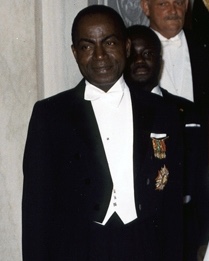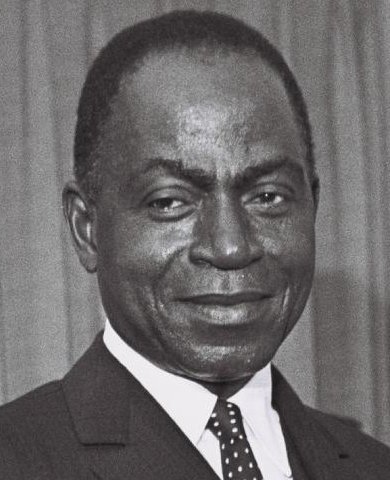|
Robert Guéï
Robert Guéï (; 16 March 1941 – 19 September 2002) was the military ruler of the Ivory Coast from 24 December 1999 to 26 October 2000. Biography Guéï was born in Kabakouma, a village in the western Man Department, and was a member of the Yacouba ethnic community. He was a career soldier: under the French administration, he was trained at the Ouagadougou military school and the St Cyr military school in France. He was an ardent supporter of longtime President Félix Houphouët-Boigny, who in 1990 appointed him chief of the army following a mutiny. After the death of Houphouët-Boigny in 1993, Guéï became distanced from the new leader Henri Konan Bédié. Guéï's refusal to mobilize his troops to resolve a political struggle between Bédié and the opposition leader Alassane Ouattara in October 1995 led to his dismissal. He was made a minister but sacked again in August 1996 and forced out of the army in January 1997. Bédié was overthrown in a coup on Christmas E ... [...More Info...] [...Related Items...] OR: [Wikipedia] [Google] [Baidu] |
List Of Heads Of State Of Ivory Coast
This article lists the heads of state of Ivory Coast, officially the Ivory Coast, Republic of Côte d'Ivoire, since the country gained independence from France in 1960. Alassane Ouattara has been serving as President of Ivory Coast since 4 December 2010. List Key ;Political parties * * * ;Other factions * ;Symbols * Elected unopposed * Died in office Officeholders Notes Timeline Latest election See also *Ivory Coast **Vice President of Ivory Coast **List of heads of government of Ivory Coast **List of colonial governors of Ivory Coast **First Lady of Ivory Coast **Politics of Ivory Coast *Lists of office-holders Sources * http://www.rulers.org * ''Guinness Book of Kings Rulers & Statesmen, Clive Carpenter, Guinness Superlatives Ltd'' References {{Heads of state and government of Africa Lists of national presidents, i Presidents of Ivory Coast, * Heads of state of Ivory Coast Lists of Ivorian people by occupation, Heads of state 1960 establishments in Ivo ... [...More Info...] [...Related Items...] OR: [Wikipedia] [Google] [Baidu] |
1999 Ivorian Coup D'état
The 1999 Ivorian coup d'état took place on 24 December 1999. It was the first coup d'état since the independence of Ivory Coast and led to the President Henri Konan Bédié being deposed. Background Ever since independence in 1960, Ivory Coast had been controlled by Félix Houphouët-Boigny. During the first decades of his rule, Ivory Coast enjoyed economic prosperity and was politically stable. However, the later years of his rule saw the downturn of the Ivorian economy and signs of political instability. Henri Konan Bédié succeeded as president after Houphouët-Boigny's death in 1993. The economic situation continued to worsen. Bédié was accused of corruption, political repression, and of stripping immigrants from neighboring countries of their political rights by promoting the concept of Ivoirité, which placed in doubt the nationality of many people of foreign origin and caused tension between people from the north and the south of Ivory Coast. Dissatisfaction kept g ... [...More Info...] [...Related Items...] OR: [Wikipedia] [Google] [Baidu] |
People Murdered In Ivory Coast
A person ( : people) is a being that has certain capacities or attributes such as reason, morality, consciousness or self-consciousness, and being a part of a culturally established form of social relations such as kinship, ownership of property, or legal responsibility. The defining features of personhood and, consequently, what makes a person count as a person, differ widely among cultures and contexts. In addition to the question of personhood, of what makes a being count as a person to begin with, there are further questions about personal identity and self: both about what makes any particular person that particular person instead of another, and about what makes a person at one time the same person as they were or will be at another time despite any intervening changes. The plural form "people" is often used to refer to an entire nation or ethnic group (as in "a people"), and this was the original meaning of the word; it subsequently acquired its use as a plural form of per ... [...More Info...] [...Related Items...] OR: [Wikipedia] [Google] [Baidu] |
Assassinated Ivorian Politicians
Assassination is the murder of a prominent or important person, such as a head of state, head of government, politician, world leader, member of a royal family or CEO. The murder of a celebrity, activist, or artist, though they may not have a direct role in matters of the state, may also sometimes be considered an assassination. An assassination may be prompted by political and military motives, or done for financial gain, to avenge a grievance, from a desire to acquire fame or notoriety, or because of a military, security, insurgent or secret police group's command to carry out the assassination. Acts of assassination have been performed since ancient times. A person who carries out an assassination is called an assassin or hitman. Etymology The word ''assassin'' may be derived from '' asasiyyin'' (Arabic: أَسَاسِيِّين, ʾasāsiyyīn) from أَسَاس (ʾasās, "foundation, basis") + ـِيّ (-iyy), meaning "people who are faithful to the foundati ... [...More Info...] [...Related Items...] OR: [Wikipedia] [Google] [Baidu] |
Presidents Of Ivory Coast
President most commonly refers to: *President (corporate title) *President (education), a leader of a college or university *President (government title) President may also refer to: Automobiles * Nissan President, a 1966–2010 Japanese full-size sedan * Studebaker President, a 1926–1942 American full-size sedan * VinFast President, a 2020–present Vietnamese mid-size SUV Film and television *''Præsidenten'', a 1919 Danish silent film directed by Carl Theodor Dreyer * ''The President'' (1928 film), a German silent drama * ''President'' (1937 film), an Indian film * ''The President'' (1961 film) * ''The Presidents'' (film), a 2005 documentary * ''The President'' (2014 film) * ''The President'' (South Korean TV series), a 2010 South Korean television series * ''The President'' (Palestinian TV series), a 2013 Palestinian reality television show *''The President Show'', a 2017 Comedy Central political satirical parody sitcom Music *The Presidents (American soul band) *The P ... [...More Info...] [...Related Items...] OR: [Wikipedia] [Google] [Baidu] |
1941 Births
Events Below, the events of World War II have the "WWII" prefix. January * January–August – 10,072 men, women and children with mental and physical disabilities are asphyxiated with carbon monoxide in a gas chamber, at Hadamar Euthanasia Centre in Germany, in the first phase of mass killings under the Action T4 program here. * January 1 – Thailand's Prime Minister Plaek Phibunsongkhram decrees January 1 as the official start of the Thai solar calendar new year (thus the previous year that began April 1 had only 9 months). * January 3 – A decree (''Normalschrifterlass'') promulgated in Germany by Martin Bormann, on behalf of Adolf Hitler, requires replacement of blackletter typefaces by Antiqua. * January 4 – The short subject ''Elmer's Pet Rabbit'' is released, marking the second appearance of Bugs Bunny, and also the first to have his name on a title card. * January 5 – WWII: Battle of Bardia in Libya: Australian and British troops def ... [...More Info...] [...Related Items...] OR: [Wikipedia] [Google] [Baidu] |
Émile Boga Doudou
Émile Boga Doudou (1952 – September 19, 2002) was an Ivorian politician who was minister of state for the interior and decentralization from 2000 to 2002. He was killed in the failed coup attempt at the start of the Ivorian Civil War. Early life and career Doudou was born in 1952 in Domaboué, near Lakota, Côte d'Ivoire.Biography at FPI website . A lawyer by profession, Doudou was married and had three children. Doudou was a founding member of the (FPI) in 1982. At the party's Constitutive Congress in 1988, he became a member of the secretariat-general of the FPI; he was subsequently a member of the secretariat-ge ... [...More Info...] [...Related Items...] OR: [Wikipedia] [Google] [Baidu] |
First Ivorian Civil War
The First Ivorian Civil War was a civil conflict in the Ivory Coast (also known as Côte d'Ivoire) that began with a military rebellion on 19 September 2002 and ended with a peace agreement on 4 March 2007. The conflict pitted the government of Ivorian President Laurent Gbagbo against a domestic insurgency led by the New Forces of Ivory Coast (''Forces nouvelles de Côte d'Ivoire''). The war was preceded by a tumultuous decade in Ivory Coast, marked by an economic downturn and, following the death of long-time Ivorian President Félix Houphouët-Boigny in December 1993, a leadership succession crisis. The succession crisis manifested in a 1999 military coup d'état and a violent dispute over the result of the 2000 presidential election. Three successive Ivorian leaders – Henri Konan Bédié from 1993, Robert Guéï from 1999, and Gbagbo from 2000 – exploited the ideology of Ivoirité to repress and marginalise political opposition, notably by disqualifying Alassane Ouattar ... [...More Info...] [...Related Items...] OR: [Wikipedia] [Google] [Baidu] |
First Lady Of Ivory Coast
{{Côted'Ivoire-stub ...
The first lady of Ivory Coast (French: ''Première dame de Côte d'Ivoire'') is the title attributed to the wife of the president of Ivory Coast. The current first lady is Dominique Ouattara, who has held the office since 11 April 2011. (Dominique Ouattara and her predecessor, Simone Gbagbo, were the co-claimants of the office from 4 December 2010 to 11 April 2011.) First ladies of Ivory Coast *Co-claimants from 4 December 2010 to 11 April 2011 See also *List of heads of state of Ivory Coast References Politics of Ivory Coast Ivory Coast Ivory Coast, also known as Côte d'Ivoire, officially the Republic of Côte d'Ivoire, is a country on the southern coast of West Africa. Its capital is Yamoussoukro, in the centre of the country, while its largest city and economic centre is ... [...More Info...] [...Related Items...] OR: [Wikipedia] [Google] [Baidu] |
Liberia
Liberia (), officially the Republic of Liberia, is a country on the West African coast. It is bordered by Sierra Leone to Liberia–Sierra Leone border, its northwest, Guinea to its north, Ivory Coast to its east, and the Atlantic Ocean to its south and southwest. It has a population of around 5 million and covers an area of . English is the official language, but over 20 indigenous languages are spoken, reflecting the country's ethnic and cultural diversity. The country's capital and largest city is Monrovia. Liberia began in the early 19th century as a project of the American Colonization Society (ACS), which believed black people would face better chances for freedom and prosperity in Africa than in the United States. Between 1822 and the outbreak of the American Civil War in 1861, more than 15,000 freed and free-born black people who faced social and legal oppression in the U.S., along with 3,198 Afro-Caribbeans, relocated to Liberia. Gradually developing an Americo- ... [...More Info...] [...Related Items...] OR: [Wikipedia] [Google] [Baidu] |
Gouessesso
Gouessesso is a village in western Ivory Coast. It is in the sub-prefecture of Biankouma, Biankouma Department, Tonkpi Region, Montagnes District Montagnes District (french: District des Montagnes) is one of fourteen administrative districts of Ivory Coast. The district is located in the western part of the country, bordering Liberia and Guinea to the west, Woroba District to the north, Sas .... References tageo.com Populated places in Montagnes District Populated places in Tonkpi {{Montagnes-geo-stub ... [...More Info...] [...Related Items...] OR: [Wikipedia] [Google] [Baidu] |

_1938.jpg)


